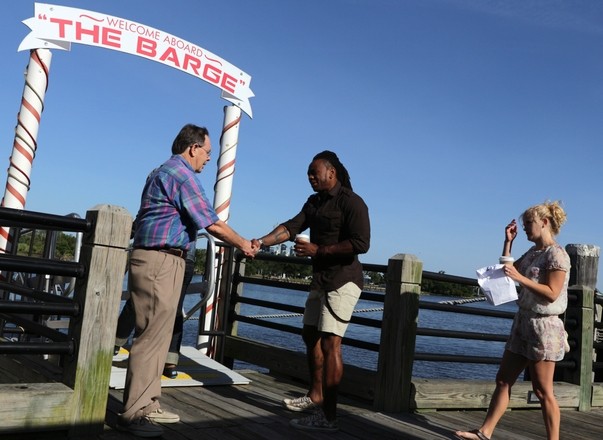John 21.15-19
Peter is a fun character – larger than life – and at the same time so real. He abandons everything to follow Jesus, yet denies even knowing the man and cusses about it. He hops out of a boat to walk with Jesus on the water, and then rebukes Jesus—commanding the God of the universe on what he should do. Now Peter is sitting back down with his friend and Jesus is asking Peter if he loves him?
The Bible originally was not written in English. For the most part the Old Testament was written in Hebrew and the New Testament was written in Greek. So the Bibles we read are translations of the original languages. Sometimes translations can be a little difficult. And this word for love in John 21 is one of those difficulties. In this section of chapter 21 there are two different Greek words for love used. Where as in English we don’t really have different words for love. In Greek they have different words that mean love. In verse 15 you find a word that is agapeo in Greek. Jesus says to Peter do you agapeo me? But then Peter responds, by not using agapeo—instead he uses a word phileo. Peter says: Lord you know I phileo you.
The word agapeo means to love with reasoning and intentional spiritual devotion. Phileo on the other hand means to have a deep, instinctive, personal affection for a person, as for a close friend.
So Jesus asks Peter if he loves him with a reasoned and intentional spiritual devotion [agapeo] and Peter answers by saying that he loves him with a deep, instinctive, personal affection as a close friend [phileo]. This is important because they are speaking different languages. They are using different words for love. This happens in the first two exchanges in vv. 15&16. Every time Peter responds to Jesus by saying that he loves him like a close friend—with a personal affection —Jesus says, in essence, then do something. Take care of those around you. The lambs and sheep. And then the third time Jesus uses the same word as Peter. Do you really phileo me? Do you really love me as a close friend?
At this point Peter’s mind starts racing. Why is he asking me this question again? Peter starts thinking about how he had denied Christ those 3-times. And now Jesus asks him 3-times if he really loves him. Peter is saddened and hurt. And with frustration he gives up. He says: Lord you know everything—including my heart. You know I love you. Here they both use the same word: Phileo. And Jesus says: then feed my sheep.
If we really love Jesus then we must do something with that love or it is not love. We can sit around and talk about that love but if we never do anything about that love then it is not love. And this is something that should be a consistent part of our lives. To the point that it becomes an everyday occurrence. Self-abandonment for others is key. This is why relationships are vitally important for us. “We” is more important than “me”. For in helping others we are truly showing that we love God. Love is a verb. It is an action. We love as a result of God’s great love for us and we do that by loving others. By feeding lambs and sheep.
At The Anchor we believe that relationships are to bring glory and honor to our Lord and Savior – that is why we are to serve side-by-side with each other. We are to serve with businesses, non-profits, and churches. We are also to live in the place where our relationships are to help each other glorify God in the earth. When we balance our relationships in a way where we both challenge one another to follow after Jesus – while at the same time be very welcoming and inviting – that is where we are to be in our relationships. And this is the place of discipleship.
One Sunday morning, in a college town, the church service had just started. The preacher was doing what preachers do as the front doors opened. And a hippie looking college student came walking in. He looked a little rough around the edges, almost like he had been up all night drinking and now was rolling in to church. As he walked down the aisle looking for a place to sit—everyone had taken their seats at the end of the pew so that he could not get in to take a seat. This happened to all the pews as he got to the very front and sat down—right on the floor. The people in the church could not believe this. Suddenly, from the back of the church the usher stood up. He walked down the aisle toward the young man. Everyone in the Church was wondering what he was going to do. The preacher was starting to get a little nervous. He was preaching on how we are to love each other—no matter who the other was. And if the usher throws this guy out, he thought that it would be problematic in light of the sermon topic. So with the usher walking—and the preacher nervous—and the congregation anxious—the man sits next to the grungy-hippie-looking college kid. Gets right on the floor with him.
He does this because Jesus asked him the question: do you love me?
Philip Jacob Spener says: “We show ourselves to be Christians and theologians by our Godly faith, holy living, and love of God and neighbors rather than by our subtle and sophistical argumentation.”
Muriel Rukeyser says: “The universe is made of stories, not atoms.”
We meet awkwardly
I invite you to walk.
I find you dancing.
~Bill Maroon – a Haiku written for teaching & religious imagination

